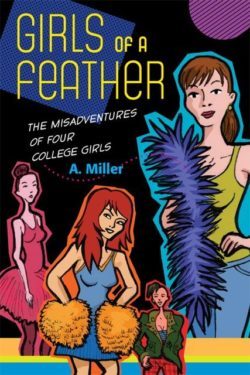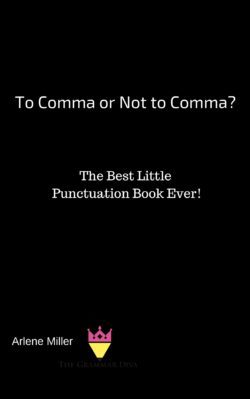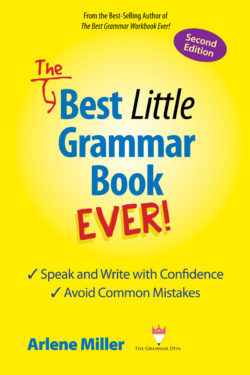Arlene Miller's Blog, page 40
May 17, 2018
More Mispronounced Words: Part 3 – L Through R
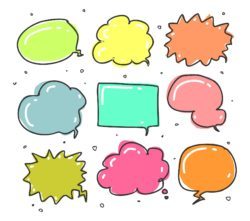 Here we go with Part 3 of commonly mispronounced words: L through R Here are Part 1 and Part 2 if you didn’t read them.
Here we go with Part 3 of commonly mispronounced words: L through R Here are Part 1 and Part 2 if you didn’t read them.
Liable – This word has three syllables and in legal terms means obligated. Libel has two syllables and is a defamatory statement.
Library – An oldie but goodie! It is a little hard to put in that first R , But it isn’t liberry.
Mauve – This is a purplish color and it does not rhyme with stove. The au is pronounced like the o in odd and like the au in slaughter.
Meme – Invented by a British scientist in 1976, it rhymes with seem, and is not pronounced mee-mee, may-may or mem.
Mischievous – This is my pet peeve of mispronunciation. It is neither spelled nor pronounced as mis-CHEE-vee-us . The word has three syllables. There is no I in the last syllable, and the accent is on the first syllable. So many people pronounce this incorrectly and tell me I am wrong when I tell them so. Rachel Maddow pronounced it wrong on her show this past week, and I almost blew a gasket.
Niche – It comes from the French. Some people (wrongly) go for a French sound and say ni-chay. Others go for a super Anglican pronunciation and say nitch. The preferred pronunciation is neesh in most dictionaries. However, nitch has become so common, it is preferred by other dictionaries.
Often – Pronouncing the t is officially a no-no, according to Merriam-Webster.
Nuclear – Another oldie but goodie. At least four presidents (Bush, Clinton, Carter and Eisenhower) have messed it up and said nucular. Switching the adjacent sounds is a linguistic phenomenon called metathesis.
Prelude – The first syllable doesn’t sound like pray . The correct pronunciation is prel-yood.
Pronunciation – I think this is a weird one. The verb is to pronounce. However, when it becomes a noun, the o gets left out.
Regime – Doesn’t sound like RUH-geem. The correct pronunciation is RAY-geem.
Want to brush up on your grammar? Check out my books on AMAZON OR GOODREADS.
May 10, 2018
A Special Mother’s Day Post

Motherhood: All love begins and ends there – Robert Browning, English poet, 1812–1889
Whether it’s Mother’s Day, Mothers Day, or Mothers’ Day (it appears to be Mother’s Day), welcome to our annual Mother’s Day post.
Some facts about Mother’s Day:
Mother’s Day is celebrated on various days and in many parts of the world—most commonly in the months of March or May. For example, in Egypt, Mother’s Day is celebrated on March 21, the first day of spring in the northern hemisphere.
In the United States, the celebration of Mother’s Day began in the early 20th century.
In 1908, the U.S. Congress rejected a proposal to make Mother’s Day an official holiday.
By the early 1920s, Hallmark Cards and other companies had started selling Mother’s Day cards.
By 1925, carnations had become associated with Mother’s Day, and the American War Mothers raised money by selling carnations. Wearing a colored carnation meant that a person’s mother was living. A white carnation indicated that a person’s mother was deceased.
In 2015, 26.4 was the average age in the United States for first-time mothers.
In its early days, people observed Mother’s Day by going to church and writing letters to their mothers.
More people purchase fresh flowers and plants for Mother’s Day than for any other holiday except Christmas and Chanukah.
In 2018, the National Retail Federation (NRF) estimates that U.S. consumers will spend $23.1 billion celebrating Mother’s Day.
Each shopper will spend an average of $180 on Mom.
Most consumers will give cards (77%) and flowers (69%) to their mothers or take her out to eat (55%) in 2018, but more money will be spent on jewelry ($4.6 billion) than any other category, according to the Retail Foundation.
According to the Insure.com 2017 Mother’s Day Index, the various tasks moms perform at home would be worth $67,619 (up from $65,523 in 2016) a year in the professional world.
Thank you to these websites for this information:
Some Mother’s Day quotes:
Mothers all want their sons to grow up to be President, but they don’t want them to become politicians in the process. John F. Kennedy 1917-1963
By and large, mothers and housewives are the only workers who do not have regular time off. They are the great vacationless class. Anne Morrow Lindbergh, American author
Mothers are the most instinctive philosophers. Harriet Beecher Stowe, American novelist, 1811-1896
Some are kissing mothers and some are scolding mothers, but it is love just the same – and most mothers kiss and scold together. Pearl S. Buck, American novelist 1892 – 1973
Teenage boys, goaded by their surging hormones, run in packs like the primal horde. They have only a brief season of exhilarating liberty between control by their mothers and control by their wives. Camille Pagia, American academic and social critics, 1947-
This is the reason why mothers are more devoted to their children than fathers: it is that they suffer more in giving them birth and are more certain that they are their own. Aristotle, 384 BC – 322 BC
Tired mothers find that spanking takes less time than reasoning and penetrates sooner to the seat of the memory. William Durant American historian and writer, William Durant, 1885-1981
We are all conceived in close prison; in our mothers wombs, we are close prisoners all; when we are born, we are born but to the liberty of the house; prisoners still, though within larger walls; and then all our life is but a going out to the place of execution, to death. John Donne, English poet 1572 – 1632
Take motherhood: nobody ever thought of putting it on a moral pedestal until some brash feminists pointed out, about a century ago, that the pay is lousy and the career ladder nonexistent. Barbara Ehrenreich, American author and political activist 1941 –
Thank you, Greatest Quotations!
Happy Mother’s Day from The Grammar Diva
May 4, 2018
Adjective, Adjective, Comma
 There are many, many, many, many, many (we will talk about that one later in this post) comma rules. Several years ago, when I was teaching, I noticed that in the Common Core standards for the grade I was teaching, the use of the “comma between two adjectives before the same noun” was one of the very few rules spelled out. I had never considered that particular comma rule very significant — but I guess I was wrong, at least as far as the educational powers-that-be were concerned.
There are many, many, many, many, many (we will talk about that one later in this post) comma rules. Several years ago, when I was teaching, I noticed that in the Common Core standards for the grade I was teaching, the use of the “comma between two adjectives before the same noun” was one of the very few rules spelled out. I had never considered that particular comma rule very significant — but I guess I was wrong, at least as far as the educational powers-that-be were concerned.
What do we mean by two adjectives before a noun?
Bright blue dress
Old torn shirt
Ambitious intelligent person
Cozy crowded room
New striped shirt
Sometimes you put a comma between the two adjectives, and sometimes you don’t. What is the rule?
If both adjectives describe the noun, use a comma between the adjectives. But if the first adjective describes the second adjective — or the idea of both the second adjective and the noun together — do not use a comma.
Bright blue dress
Old, torn shirt
Ambitious, intelligent person
Cozy, crowded room
New striped shirt
How can you tell? If it isn’t obvious, the best way to check is 1) See if you can put “and” between the two adjectives. 2) You can even remake the sentence for purposes of testing out the adjectives by making them a clause at the end of the sentence:
Bright and blue dress
That dress, which is bright and blue…
That doesn’t really make sense. The dress is blue, and the blue is bright. Bright is really describing the type of blue, not really just the dress. So, no comma here.
Old and torn shirt
My shirt, which is old and torn.
That one makes sense with the and, so you would use a comma. One more…
Ambitious and intelligent person
We need to hire someone who is ambitious and intelligent.
That one makes sense with and, so use a comma.
Here are a few other things concerning this comma rule:
1 If the sentence already contains the word and, of course you use no commas. We need to hire a hardworking and ambitious employee.
2. The same rules apply if there are more than two adjectives:
The ambitious, personable, intelligent person we hired hasn’t really worked out well.
The torn, bright blue dress can’t be fixed.
It was a cold, dark, rainy night.
It was a navy blue striped dress. I wouldn’t put any commas here. The navy blue is really describing the stripes or the striped dress, not just the dress.
3. Of course there is NEVER a comma between the final adjective and the following noun: It was a dark, rainy, cold, night. (NO)
What about “Starry, Starry Night”? What about the first sentence of this blog post? What about adjectives that are repeated for effect? Well, you learn (at least I do) something new every day. I just googled “Starry Starry Night”. Well, the painting by Van Gogh is actually called The Starry Night. However, the song by Don McLean is “Starry Starry Night.” And I found it both with and without the comma between the two starrys.
In formal writing we really wouldn’t repeat a n adjective. But in most creative types of writing, we might. I guess whether or not you want to use commas between the adjectives depends on the effect you want it to have. I would say all bets are off with that one.
Grammar Diva News
Speaking of commas, my next book will be To Comma or Not to Comma: The Best Little Punctuation Book Ever – out some time this summer!
Girls of a Feather is available now on Kindle for just 99 cents for the month of May. It will be up on Amazon as a paperback in a day or two, and it will be available on other e-readers in the next week or two.
April 19, 2018
Breaking the Rules Part 2
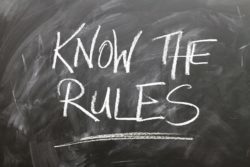 Last week we talked about some grammar “rules” that can now be “broken,” including beginning sentences with conjunctions, ending sentences with prepositions, splitting infinitives, and using they as a singular pronoun. Today we will talk about three more of those “rules.”
Last week we talked about some grammar “rules” that can now be “broken,” including beginning sentences with conjunctions, ending sentences with prepositions, splitting infinitives, and using they as a singular pronoun. Today we will talk about three more of those “rules.”
1.Using em dashes instead of quotations marks. Yup. Some authors are using em dashes in their dialog rather than quotation marks. So there is no more “he said,” or “she said.” Just dashes and something someone said.
—I didn’t say that.
—Yes, you did. I heard it.
—I would never say anything like that.
—Well, you did, and I can prove it.
I haven’t personally read any books with this method of doing dialog, but I know that the author Roddy Doyle does. I have not read him, but he does dialog that way in his 2017 novel, Smile.
2. Using run-on sentences. Before we continue, let’s clear up exactly what a run-on sentence is. Many people think a run-on sentence is simply a really long sentence. They are not the same. Sometimes a run-on sentence may indeed be a very long sentence, but there are long sentences that are not run ons, and there are short run ons. A run-on sentence is one that actually contains more than one complete sentence, but there is no period or semicolon—or conjunction. Usually a run on is put together with a comma, which cannot be used by itself to separate two sentences. A sentence can be long enough to go around the equator, but if it has enough semicolons and conjunctions, it could be a legitimate sentence—although obviously a poorly written one.
Here is a run-on, even though it is short: Don’t worry, be happy.
Here is a legitimate sentence, although rambling and not a good one: I got up early and then went out to have breakfast, and then I played some tennis with some friends before getting some errands done, after which I took a short nap, and then I sat out in the sun reading until dinner time, and then I picked up a friend and we went out dancing.
It was the best of times, it was the worst of times . . . Charles Dickens used run ons, as did Faulkner (or was it Hemingway? I can never keep them straight, and I don’t like either one). I am sure many contemporary authors do as well. Is it okay?
Frankly, I see no reason to use run-on sentences. What is wrong with using a period or semicolon instead of the comma? Or maybe putting a conjunction in? I think one possible situation in which one might want to use a run-on sentence is for pacing, particularly in dialog. Using commas between a few consecutive sentences someone says could be used to indicate that they are running on and on without stopping. I guess you could even have such a situation in narration.
To my eye, run-on sentences are even worse than sentence fragments. Fragments seem to have a place in some types of writing, particularly promotional. Run-on sentences, to me, just seem, well, wrong. Certainly run ons (and fragments) don’t belong in formal or academic writing. But then, I am sure there are exceptions to that idea too.
The worst thing, of course, is when a reader catches a writer using a run-on sentence in a situation where the writer obviously simply didn’t know his or her mistake.
3. Using who instead of whom. Many people never use whom at all. And it is probably preferable to never use whom than to use it where who should be used. That just sounds weird: Whom are you? (Nope. Wrong time to try to use whom.) I have heard that by 2025, whom will be gone, so that is good news for those who don’t know the difference. It is bad news for those of us who do know the difference and are grammar snobs because we do.
What is the difference? Who is a subjective pronoun like I or he or we. Whom is an objective pronoun like me or her or us. Who is thus used for subjects, and whom for objects. You can figure out if you have a subject or an object on your hands by finding all the verbs in the sentence in question. Locate the subject for each verb. If it looks like who(m) must be the subject because you can’t find any other subject for the verb, then use who. Also, you use whom after prepositions such as for (whom), with (whom), to (whom), etc.
Grammar Diva News
Now available on Kindle at a special introductory price of 99 cents: Get your summer reading ready! (Available on all other e-readers in about a week. Available on Amazon in paperback in a couple of weeks.)
Breaking the Rules Part 1
 Grammar rules. Are there really any rules at all, or are there just guidelines and standards? Depends whom you ask. If you ask a grammar prescriptivist, they will tell you that there are rules — and please don’t break them. If you ask a grammar descriptivist, they will tell you there are standards, but when people begin to break a certain standard, then a new standard is born.
Grammar rules. Are there really any rules at all, or are there just guidelines and standards? Depends whom you ask. If you ask a grammar prescriptivist, they will tell you that there are rules — and please don’t break them. If you ask a grammar descriptivist, they will tell you there are standards, but when people begin to break a certain standard, then a new standard is born.
I lean toward prescriptivism.
This week and next, I will talk about some “rules” that are now becoming outdated, or modified, or allowed, or whatever you would like to call it.
Remember Star Trek’s famous quote? To boldly go where no man has gone before (or something like that). Well, that is a split infinitive. An infinitive is a verb with to in front of it. Here the infinitive is to go . But as you see, the adverb boldly has boldly been stuck in there, splitting the infinitive. That used to be a no-no for some reason, but no longer. You don’t need to say To go boldly where no man has gone before OR Boldly to go where no man has gone before. Split to your heart’s content.
Where are you at? Well, I would not recommend that you say that, but that question is an example of ending a sentence with a preposition. Prepositions are those little words like at, with, of, to, from, over, under. …there are lots of them. You can end a sentence with one, but in that example, you don’t need the at at all, so why put it there? Generally, we want to put a preposition at the end of a question beginning with whom : Whom are you going with? Whom are you giving that to? Whom are you waiting for? To some of us, it sounds a little awkward or stilted or overly formal to say With whom are you going? To whom are you giving that? For whom are you waiting? So in those cases, it is fine to end with the preposition if you like. However, Where are you at? Where are you going to? No. Your sentence is fine and complete without that ending preposition.
So, as you see, I have started this sentence (and some others here) with a conjunction! Oh, no! Can we do that now? The coordinating conjunctions we are talking about here are and, but, so, yet, and maybe or We certainly start our sentences with conjunctions in conversation. I start some sentences with conjunctions in my books. Starting sentences with conjunctions is never necessary, but in informal writing, it is okay to do it — just don’t get carried away.
So there. I have just written a sentence fragment. So there is not a sentence. Neither is For one day only . These are fragments — not complete sentences. You see them all the time in promotional writing, and of course in conversation. Here’s what I think about using fragments: You can break a rule as long as you know you are breaking it. So, if you know what a fragment is and you decide to use one for effect, go ahead. However, if you mean to write a sentence and you use a fragment because you don’t know the difference, that is a different story. If you are writing dialog, you will likely use fragments. If you are writing some type of promotional literature or ads, you will probably use fragments. If you are writing creative nonfiction, you may use fragments. If you are writing a formal letter or essay, trying to get into college or trying to get a job — well, I wouldn’t. Teachers sometimes mistakenly tell students not to start sentences with the word because. Of course, you can start a sentence with because. However, sometimes students will end the sentence and put a period before the sentence is complete, thus writing a fragment by mistake: Because the movie is playing so late. That is a fragment. Because the movie is playing so late, I don’t think I will be able to go. That is a sentence.
If anyone wants a piece of pizza, they can take one. Okay, let’s delve into this landmine. Anyone is a pronoun. Pronouns can be either singular or plural, just like nouns. And just like nouns, singular pronouns take singular verbs; plural pronouns take plural verbs. Wants is singular ( he wants, they want ). So, we can assume anyone is also singular. Anyone, someone, no one, something, everything, everyone, everybody, someone, something, and somebody (among other such pronouns) are all singular. Moving along in that sentence, we see the word they . They refers to the same person as anyone , right? But they is plural, right? And if they and anyone refer to the same person/people, they should agree (both singular or both plural), right? Well, yes. So what are your choices, since the English language does not (yet) have a non-gender-specific third person pronoun (except it, which refers to things). If everyone assembled is female, you use she . If everyone is male, you use he . But what if such is not the case? Your choices used to include these: If anyone wants a pice of pizza, he or she can take one. If anyone wants a piece of pizza, he can take one (now unacceptable). If anyone wants a piece of pizza, he/she? (s)he? What? The best solution is to just rewrite the sentence to avoid the issue altogether, which is usually very easy to do: Anyone who wants a piece of pizza can take one. Take a piece of pizza! However, if rewriting doesn’t strike your fancy, you can now use they as a singular. But I wouldn’t personally do it.
Grammar Diva News
Tomorrow, Saturday, April 21, is the Redwood Writers Conference “From Pen to Published.” I will be attending and will be a coach for editing and publishing.
Going on sale on Amazon and Kindle (and likely elsewhere) next week. Special Kindle price while you stock up on your beach reading:
I have begun work on my next book, which will be out sometime this summer:
To Comma or Not to Comma? The Best Little Punctuation Book Ever!
(not the real cover- just playing!)
April 13, 2018
20 Interesting Facts About the History of Our Language
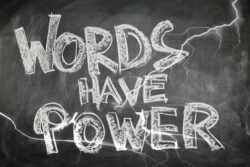 Here are 20 fascinating facts about the history of the English language. If you have heard me speak, you have probably already heard some of these (just a warning):
Here are 20 fascinating facts about the history of the English language. If you have heard me speak, you have probably already heard some of these (just a warning):
According to Global Language Monitor, the estimated number of words in the English language is 1,025,109. There is some controversy over that exact figure, but it’s safe to say there are over a million.
There is actually something called the Society for the Promotion of Good Grammar. It was founded by Martha Brockenbrough, who designated March 4 as National Grammar Day in 2008.
English is a hodgepodge of many languages: Latin, Greek, French, German, Dutch, and others.
Chaucer was the first writer who chose to write in English, although it is an English that might sound pretty foreign to us.
Shakespeare is probably the most famous person to write in English. He added many words and idioms to the language including these: it’s Greek to me, salad days, vanished into thin air, refuse to budge an inch, green-eyed jealousy, tongue-tied, fast and loose, tower of strength, in a pickle, knitted your brows, slept not a wink, laughed yourself into stitches, the long and short of if, foul play, without rhyme or reason, dead as a door nail, and laughing stock.
Shakespeare had one of the largest vocabularies of any English writer at about 30,000 words. Estimates of an educated person’s vocabulary today is half that, or 15,000.
The book generally regarded as the first English dictionary was published in 1604 with only 120 pages; it was called A Table Alphabetical, written by Robert Cawdray, a schoolmaster and clergyman containing “hard words for ladies or other unskillful persons.”
The first “real” dictionary was published in 1755 and was written by Samuel Johnson. A Dictionary of the English Language, sometimes published as Johnson’s Dictionary, is among the most influential dictionaries in the history of the English language.
Webster published his first dictionary in 1806, having written some grammar and spelling books before that.
Gadsby, a book written by Ernest Vincent Wright, has over 50,000 words in it (about 250 pages), none of which contain the letter e! And you can get it on Amazon for about 7 bucks.
China has more English speakers than the United States.
A new word is added to the English language every two hours, and about 4000 new words are added to the dictionary every year.
Since 2001, English has been the official language of all international air travel, regardless of the nationality of the pilots.
In its earliest known written record, the English alphabet had 29 letters.
Samuel Johnson left the letter X out of his dictionary, claiming that X “begins no word in the English language.”
One-fourth of the world’s population speaks at least some English.
The United States doesn’t have an official language.
Engish is the only major language that doesn’t have any organization guiding it. French has the Académie Française, Spanish has Real Academia Española, and German has Rat für Deutsche Rechtschreibung. These organizations are responsible for controlling the evolution of their respective language in terms of usage, vocabulary, and grammar.
English is the official language of 67 countries and the third most commonly spoken language in the world (the first and second are Mandarin Chinese and Spanish). The closest languages to English are Dutch and West Flemish.
Over 80% of the information stored on computers worldwide is in English.
Grammar Diva News
I will be a coach at the Redwood Writers Conference – Pen to Published – on Saturday, April 21. M y areas of expertise are editing/grammar and self-publishing.
Girls of a Feather, my novel (republished this year under this new name) is available for free in installments on Wattpad. After I post some of the book, it will be available in its entirety on Kindle at a really low price. I will let you know when it is released, so you can add it to your beach-reading list.
I am currently working on my next book, To Comma or Not to Comma: The Best Little Seriously Funny Punctuation Book Ever! (or something like that)
Check out all my books on Amazon (or wherever else you like) and if you own one or two, reviews are always greatly appreciated.
April 5, 2018
Redundancy: It Bears Repeating!
Being repetitious. We are all guilty of it. You know how someone might tell the same joke or the same story over and over again — and we listen without saying  anything? Or someone keeps repeating the same idea, and we just want him or her to get on with it?
anything? Or someone keeps repeating the same idea, and we just want him or her to get on with it?
Yup. We lose patience with redundancy. And most of us are also guilty of it in our writing — and speaking — but not so blatantly. We aren’t talking about repeating jokes or stories or ideas, but just saying a word or phrase that isn’t necessary because the word next to it means the same thing.
Unless we are getting extra credit for having more words, we really should try to avoid these redundancies. Here are some sentences with common redundancy issues:
The meeting is at 8 a.m. in the morning. Use a.m. OR morning. You don’t need both.
This dress I found on sale is completely unique. I guess it’s like being completely pregnant.
This car is particularly small in size. As opposed to small in color? weight?
I haven’t finished the first draft of my book as yet. Drop the as.
I live in close proximity to where I work. As opposed to far proximity? I live close to where I work.
In my personal opinion, this idea will never work. If it’s yours, it is probably personal.
Each and every person in this room needs to fill out the forms. Pick one.
This past year we cut our costs by 25 percent less. You don’t need less. We know.
The smell of your perfume permeates through the room. Per- means through. Permeates the room.
It is an actual fact that many fruits are good for dogs. Well, this used to be a redundancy before we had alternative facts. Never mind.
I looked into her past history, and now I understand her behavior. Pick one.
I will love you forever and ever. Romantic, but . . .
We have been doing it this way forever and ever. There. That’s better. You don’t need the and ever.
We are going to postpone this meeting until later. Unless you add some details, you don’t need the later. But you could say We are going to postpone the meeting until later today or later this week.
Well, isn’t this an unexpected surprise? Surprises are rarely expected. That is why they are called surprises.
She made a few unintentional mistakes on her final exam. I don’t think she would be making intentional mistakes on her exam . . .would she?
If you buy one bottle of these vitamins, you will get a free gift. I don’t like gifts I have to pay for. Do you?
The end result of her cheating was that she was expelled from college. Just result will do.
The company is known for the number of new innovations it has come up with just this year. Are there old innovations?
He has reverted back to his old ways of coming in late and leaving early. Reverting is always back. Reverted to is enough.
Grammar Diva News
If you don’t already subscribe to this weekly blog, subscribe and receive a free grammar book download.
Looking forward to being a coach at the Redwood Writers Pen to Published conference on Saturday, April 21. My areas of expertise for coaching are grammar/editing and self-publishing.
Girls of a Feather: The Misadventures of Four College Girls is ready to go, but not yet available. I am deciding whether to do a little advance publicity before it goes on sale. But of course, I will let you know when it does.
SPECIAL PRICE!!! Where can you get the second (newest) edition of The Best Little Grammar Book Ever? On Kindle, only for the month of April. The paperback retails for $15, and the e-book is usually $5.99.
March 29, 2018
More Mispronounced Words: Part 2 – F Through J
 Several weeks ago I posted about ten words from A through E that are commonly mispronounced. This post continues with some words from F through J that are often mispronounced:
Several weeks ago I posted about ten words from A through E that are commonly mispronounced. This post continues with some words from F through J that are often mispronounced:
foliage — The word has three syllables. Say FO-LI-UJ, not FOL-UJ. And certainly not FOIL-UJ.
forte — There are two words spelled this way. One comes from Italian and the other from French. The Italian word is a musical term meaning “loud” and is pronounced with two syllables, FOR-TAY. The French word, an adjective meaning “strength” or “strong point,” is pronounced with one syllable: FORT.
federal — This word should really be pronounced with all its three syllables: FEDERAL, not FED-RAL.
frustrate — Yes, it is frustrating to hear people pronounce this word as if the R were silent. It is FRUSTRATE, not FUS-TRATE.
gala — This word is pronounced GAY-LUH, even if it might sound fancier to pronounce it GAH-LUH.
GIF (graphics interchange format) — Those short social media videos are pronounced with a hard G, not JIF.
gyro– This one is not pronounced like gyroscope, This Greek treat is pronounced YEE-ROH and was added to the dictionary this year.
Halloween – This word derives from “Hallowed Evening,” or “holy evening.” It is not pronounced as HOLLO-WEEN, but rather HALLO-WEEN.
height – Not to be confused with width, which ends in a TH, height ends with only a T. It is HEIGHT, NOT HEIGHTH.
heinous — Meaning very bad, the word is pronounced HAY-NUS, not HEE-NUS or HEEN-I-US.
hummus — This yummy spread made out of chickpeas is pronounced HOOM-US. There is not HUMMING in it.
jewelry – The word has three syllables and is pronounced the way it is spelled: JEW-EL-RY. It is not pronounced JEW-EL-ER-Y, JEWL-RY, or JEW-LER-Y.
HAPPY EASTER, HAPPY PASSOVER, OR HAPPY WEEKEND TO ALL!
If you don’t current subscribe to this weekly blog and you would like to, please click here. You will get a free grammar book download along with your subscription It is all free. What could be better than that?
Please check out all my books on my Amazon Author Page!
March 22, 2018
Punctuation Talk: Explanations of Last Week’s Quiz Answers
 Last week’s blog post was a punctuation quiz. The answers were given, but the longer explanations were not. They will be given in this post. If you are a new subscriber, just click here to see last week’s post and take the quiz (Quick! Before you look at the answers and explanations here).
Last week’s blog post was a punctuation quiz. The answers were given, but the longer explanations were not. They will be given in this post. If you are a new subscriber, just click here to see last week’s post and take the quiz (Quick! Before you look at the answers and explanations here).
OK…I will leave a little space here before the explanations — enough space to thank every one of you who was able to attend my book launch last Friday evening, March 16. Today, I saw in the local newspaper that The Best Little Grammar Collection Ever! was the #3 bestselling fiction/nonfiction book last week at Petaluma Copperfield’s Books!
But enough bragging. Here is a discussion of the quiz and the answers…
1. I will be late for the meeting, please save me a seat. Not correct. Needs a semicolon or period instead of the comma; or you add a conjunction to the comma.
One of the most common grammar issues is the comma splice — trying to separate two complete sentences with just a comma and no conjunction. Otherwise, known as a run-on sentence, it is incorrect! Sometimes novelists will do it to indicate speed of dialogue or narration, but it has no place in formal or business writing. In this particular example, you could add the conjunction so, or you could change the comma to a semicolon; the semicolon can separate two sentences. Of course, you could always just make it two sentences, using a period after meeting and starting please with a capital P.
2. This must be James’s book.
Many of us claim to have learned in school — way back — that if a singular ended in an s, we wouldn’t add apostrophe s for the possessive, but simply just an apostrophe.We do that with plurals that end in s (the girls’ bicycles are in the garage), but not for singular words ending in s, unless we don’t pronounce the ‘s syllable. You would pronounce it James’s, so you should write it that way. Sometimes you don’t pronounce the ‘s. Let’s say his name was Miles instead. You very well might not say Miles’s. You might just say Miles’ car is in the shop. So here you have a choice. Generally we do pronoun that ‘s: my boss’s desk, the princess’s slipper, Frederick Douglass’s quote.
3. I am here, therefore, I am not there. Incorrect. Comma after here needs to be a semicolon. (Or you could put a period after here, and initial cap therefore.)
If you take out the word that is set off in commas, you see that you have two sentences, or a run on. I am here, I am not there. Since therefore is not used to connect two sentences, you need to do something. You need a period or a semicolon after the first sentence: I am here. Capitalize therefore if you used a period, leave everything else the same, and you are done. In some sentences therefore is fine set off with commas. How do you know? Take out the therefore (or however). If the sentence is okay, you can leave the commas. If the sentence is a run on, you need a semicolon.
4. Did he ask, “Are we there yet?”
You were asked to punctuate this sentence. Here is the correct punctuation. Of course, there is a comma after ask, separating the quotation from the other part of the sentence. Are we there yet is the quote, so there are quotation marks around each side. The big question is where to put the question mark. Question marks can go either inside or outside quotation marks. In this case the entire sentence is a question, and the quoted part is also a question. But we don’t use two question marks. Here is the rule:
If the entire sentence is a question, but the quoted part isn’t, the question mark goes outside the quotation marks.
If the entire sentence is a statement, but the quoted part is a question, the question mark goes inside the quotation marks.
If they are both questions, as they are in this example, the default is to put the question mark inside the quotation marks.
5. He said, “I heard the song ‘Forget You.”’ Correct as is.
This punctuation is correct, although the quotation marks might display funny on your computer. We have the comma after said, as usual. Then, what we have here is a quote within a quote, since song titles are quoted, not italicized. And we use single quotes for quotes within quotes. Periods always, always, always go inside quotes in American English, so the period is inside the single quote that goes with the song title and the double quote that goes with the end of the spoken part of the sentence.
6. “The Hobbit” is my favorite book. No. The Hobbit should be italicized rather than in quotation marks.
Book titles are italicized. The rule of thumb is that whole things are italicized and parts of those things are in quotation marks:
Italicized: book titles, movie titles, TV series titles, magazine titles, newspaper titles, paintings, titles of plays and operas, CDs
In quotes: chapter titles, title of an act in a play, newspaper or magazine article, episode of a TV series, songs.
7. This book is from the 1940s.
No apostrophe needed. Basically it is a plural. Plurals don’t have apostrophes except on rare occasion (a‘s, i‘s u‘s because of confusion ).
8. Please bring two shirts; blue, black, and brown pants; and black and blue socks. Or you could rewrite it somehow.
This series is unclear with just commas. Semicolons can be used to separate larger items in a series when there are already commas used. So two shirts is one item. The next item is three colors of pants, so commas separate the colors, and then a semicolon is once again used to separate the entire pants item. If you use semicolons in a list that already has commas, you need to make sure you separate each big item with a semicolon, even the items without commas in them. If you can think of a way to rewrite the sentence or separate it into more than one sentence, that is another way around it. Clarity is king! Or queen!!
9. She said, “I can’t go because I have to stay home to read Romeo and Juliet.”
Comma after said to separate the quoted part of the sentence, quotation marks around the quoted part, and Romeo and Juliet in italics because it is the name of a whole play. Period always inside the quotation marks.
10. My sister and her friends are coming to visit. Correct as is.
Some would be tempted to put a comma after sister or friends, but why????
11. Bob was usually a quiet man; however, he screamed upon entering the room. You could also put a period after man and capitalize however.
If you take out however, you see that you have two sentences — a run on– since however cannot be used to separate two complete sentences. Use a semicolon or a period after man. However, takes a comma after it. I you use a period, capitalize However.
12. To whom it may concern:
There is a colon after the salutation of a business letter. Use a comma for friendly letters. Sometimes with e-mail, there is probably a gray area!
13. It is a cold, rainy day. No. You need a comma between cold and rainy.
Sometimes you need a comma between two adjectives. Generally the rule is that if both adjectives are describing the noun, you use a comma between them, but if one adjective is actually describing the other adjective, and the second adjective is describing the noun, there is no comma. The best way to figure it out is to say it with and between the two adjectives. If it makes sense to put an and in when you say it, you probably need a comma. Look at this example of no comma needed: I looked at the bright blue sky.
14. This book, which is written by William Golding, is my favorite. No. The clause beginning with which needs to be set off with commas.
We are setting off the clause with beginning with which with commas because is it nonessential and could be left out without making the meaning unclear. The clause which is written by William Golding is a “by-the-way,” or added information. Because you refer to this book, it is probably clear which book you are talking about. It is nice to know who wrote the book, but the meaning is that the book you are showing to the listening is your favorite.
15. The book that is on top of the coffee table is next on my reading list. Correct as is.
On the other hand, the clause beginning with that is not set off with commas because it is essential. It identifies which book you are talking about: the book that is on top of the table. Take it out and the sentence is unclear.
16. I decided not to cook dinner and went to the movies instead. Correct as is.
No comma after dinner because this is not a compound sentence. A compound sentence is two complete sentences joined by a conjunction (or a semicolon). Went to the movies instead is not a complete sentence because the subject is missing. If the subject were there, we would use a comma: I decided not to cooke dinner, and I went to the movies instead.
17. I was born on August 10, 1980, in Lincoln, Nebraska.
These are just some comma standards: There is a comma after the month and day (but no comma if just the month is mentioned and not the day). There is always a comma after the year in a sentence. There is a comma between the city and state and a period at the end.
18. The only four ingredients in this recipe are sugar, vanilla, eggs, and flour. The comma after eggs (the Oxford comma) is optional, but I recommend using it.
Some people want to put a colon after are. This is not correct. Why interrupt a perfectly good sentence? In a list don’t use a comma after a verb. In this case you would use a colon: The only four ingredients in this recipe are as follows: sugar, vanilla, eggs, and flour.
19. I did not do very well on the test, however, so I failed the course.
Yes, you can set the however off with commas. There is no semicolon needed here. Take out the however. You are left wth a perfectly good sentence, not a run on because you have a conjunction (so). Commas are correct here.
20. Yes, Elaine, the party is at my house.
More comma standards. There is a comma after Yes and No at the beginning of a sentence. There is also a comma after Elaine, which is called direct address, or addressing someone by their name.
21. My address is 1487 Markham Place, Boston, Massachusetts 01987; please send my mail there, not to my old address. You could also put a period after the zip code and initial cap please.
More comma standards. When writing an address in text (as opposed as to on an envelope), put a comma between the street address and the city. Always put a comma between the city and the state. Never put a comma between the state and the zip code. You need a period or a semicolon before please because it begins a new sentence. The comma between there and not is one of “contrary information.”
22. I want to see that movie, I heard it’s great, but I haven’t had the time. Not correct. You can use dashes or parentheses, but not commas to set off I heard it’s great.
The main problem here is that the section set off in commas (I heard it’s great) is a complete sentence, and we can’t do that. You can use dashes, you can use parentheses. You can also put a semicolon or a period after movie and make it two sentences. It is kind of a double comma splice with the commas.
23. Not correct. The ellipsis(…) is used for trailing off. The em dash(long dash) is used for interruption.
She screamed, “I have had enough of this—”
“Calm down,” he interrupted.
This is rather new to me — not one to enjoy reading about ellipses. However, in the case of an interruption, a dash is used, not an ellipsis. Ellipses are used to indicate missing information or a trailing off. This dialog indicates an interruption rather than a trailing off.
If you are reading this post, but have not yet subscribed to the weekly posts, click here – and get a free download too!
Buy a book. Write a review. Make a writer happy. Thank you!
I apologize for any typos you might find in this post. I know it is inexcusable, especially for a grammarian. But my eyes cannot take looking at this screen for one more minute!
March 15, 2018
A Punctuation Quiz—Just Because
 My next book will be a “little” (of course!) punctuation book, which I am hoping will be out in June or so . . .
My next book will be a “little” (of course!) punctuation book, which I am hoping will be out in June or so . . .
To warm up, here is a “little” punctuation quiz. Actually, I planned a punctuation quiz for a couple of weeks ago because I thought it was National Punctuation Day. I was a “little” confused; it was National Grammar Day. National Punctuation Day is in September.
Answers to this quiz will be at the end . . . after you scroll down a bit. Explanations will be provided next week.
1. Is this sentence correctly punctuated? I will be late for the meeting, please save me a seat.
2. This must be (James’/ James’s) book.
3. Is this sentence correctly punctuated? I am here, therefore, I am not there.
4. Punctuate this sentence: Did he ask, Are we there yet
5. Is this sentence correct? He said, “I heard the song ‘Forget You.”’
6. Is this sentence correct? Why or why not? “The Hobbit” is my favorite book.
7. This book is from the (1940’s/ 1940s).
8. Punctuate this sentence: Please bring two shirts, blue, black, and brown pants, and black and blue socks.
9. Punctuate this sentence: She said I can’t go because I have to stay in to read Romeo and Juliet.
10. Is this sentence correctly punctuated? My sister and her friends are coming to visit.
11. Punctuate this sentence: Bob was usually a quiet man however he screamed upon entering the room.
12. Punctuate this letter salutation: To whom it may concern
13. Is this sentence correctly punctuated? It is a cold rainy day.
14. Is this sentence correctly punctuated? This book which is written by William Golding is my favorite.
15. Is this sentence correctly punctuated? The book that is on top of the coffee table is next on my reading list.
16. Is this sentence correctly punctuated? I decided not to cook dinner and went to the movies instead.
17. Punctuate this sentence: I was born on August 10 1980 in Lincoln Nebraska.
18. Punctuate this sentence: The only four ingredients in this recipe are sugar vanilla eggs and flour.
19. Punctuate this sentence: I did not do very well on the test however so I failed the course.
20. Punctuate this sentence: Yes Elaine the party is at my house.
21. Punctuate this sentence: My address is 1487 Markham Place Boston Massachusetts 01987 please send my mail there not to my old address.
22. Is this sentence correctly punctuated? I want to see that movie, I heard it’s great, but I haven’t had the time.
23. Is this dialog correctly punctuated?
She screamed, “I have had enough of this . . .”
“Calm down,” he interrupted.
Please scroll down for the answers.
Keep scrolling . . .
Coming next week to Amazon and Kindle (and all other online book and e-book sellers) . . .
Keep scrolling . . .
Keep scrolling . . .
Answers:
1. I will be late for the meeting, please save me a seat. Not correct. Needs a semicolon or period instead of the comma; or you add a conjunction to the comma.
2. This must be James’s book.
3. I am here, therefore, I am not there. Incorrect. Comma after here needs to be a semicolon. (Or you could put a period after here, and initial cap therefore.)
4. Did he ask, “Are we there yet?”
5. He said, “I heard the song ‘Forget You.”’ Correct as is.
6. “The Hobbit” is my favorite book. No. The Hobbit should be italicized rather than in quotation marks.
7. This book is from the 1940s.
8. Please bring two shirts; blue, black, and brown pants; and black and blue socks. Or you could rewrite it somehow.
9. She said, “I can’t go because I have to stay home to read Romeo and Juliet.”
10. My sister and her friends are coming to visit. Correct as is.
11. Bob was usually a quiet man; however, he screamed upon entering the room. You could also put a period after man and capitalize however.
12. To whom it may concern:
13. It is a cold, rainy day. No. You need a comma between cold and rainy.
14. This book, which is written by William Golding, is my favorite. No. The clause beginning with which needs to be set off with commas.
15. The book that is on top of the coffee table is next on my reading list. Correct as is.
16. I decided not to cook dinner and went to the movies instead. Correct as is.
17. I was born on August 10, 1980, in Lincoln, Nebraska.
18. The only four ingredients in this recipe are sugar, vanilla, eggs, and flour. The comma after eggs (the Oxford comma) is optional, but I recommend using it.
19. I did not do very well on the test, however, so I failed the course.
20. Yes, Elaine, the party is at my house.
21. My address is 1487 Markham Place, Boston, Massachusetts 01987; please send my mail there, not to my old address. You could also put a period after the zip code and initial cap please.
22. I want to see that movie, I heard it’s great, but I haven’t had the time. Not correct. You can use dashes or parentheses, but not commas to set off I heard it’s great.
23. Not correct. The ellipsis(…) is used for trailing off. The em dash(long dash) is used for interruption.
She screamed, “I have had enough of this—”
“Calm down,” he interrupted.
Explanations next week . . .


